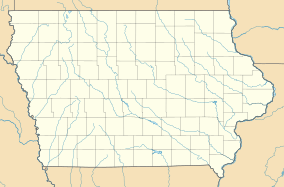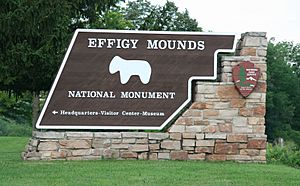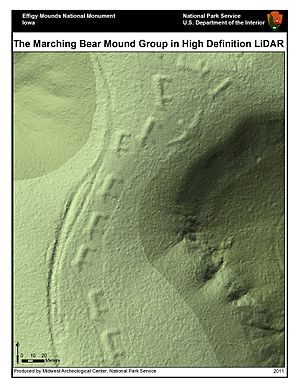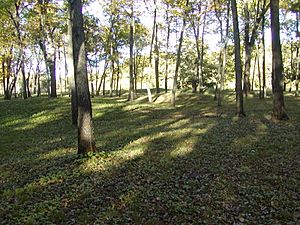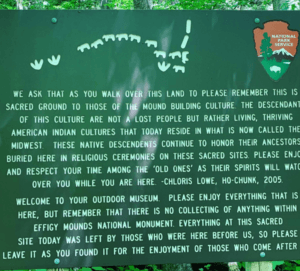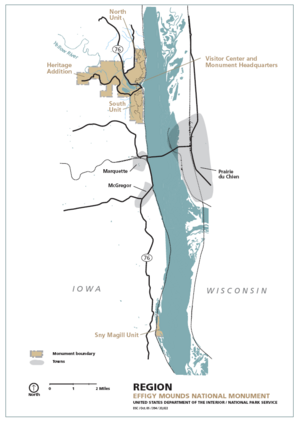Effigy Mounds National Monument facts for kids
Quick facts for kids Effigy Mounds National Monument |
|
|---|---|
|
IUCN Category III (Natural Monument)
|
|
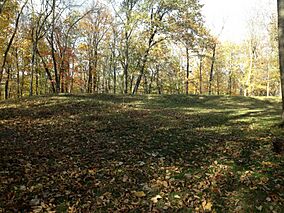
Big Bear Mound at Effigy Mounds National Monument
|
|
| Location | Allamakee / Clayton Counties, Iowa, USA |
| Nearest city | Marquette, Iowa and Dubuque, Iowa |
| Area | 2,526 acres (10.22 km2) |
| Created | October 25, 1949 |
| Visitors | 77,195 (in 2016) |
| Governing body | National Park Service |
| Website | Effigy Mounds National Monument |
Effigy Mounds National Monument is a special place that protects over 200 ancient mounds. These mounds were built by Native American cultures long ago, mostly around 1,000 to 2,000 years ago. Many of these mounds are called effigy mounds because they are shaped like animals, such as bears and birds.
This monument is located in Allamakee and Clayton County, Iowa in the United States. The park's visitor center is in Harpers Ferry, Iowa, near Marquette, Iowa. In 2017, the Effigy Mounds were even featured on a special America the Beautiful Quarters coin!
Contents
Discovering Ancient Mounds
Ancient earthworks, or mounds made of soil, are common in the Midwest. But mounds shaped like animals, birds, or reptiles are quite unique. These "effigy" mounds were mainly built by people in what is now Wisconsin, northeast Iowa, and parts of Minnesota and Illinois. A famous exception is the Great Serpent Mound in Ohio.
Effigy Mounds National Monument is on the western edge of this special effigy mound region. The park has different sections. The North Unit and South Unit have 96 mounds together and are easy to visit. The Sny Magill Unit is about 11 miles (18 km) south and has 112 mounds, but no visitor services. In total, the monument covers 2,526 acres (10.22 km2) and protects 206 mounds. Thirty-one of these are effigy mounds. The biggest one, called Great Bear Mound, is 42 meters long and rises over a meter high!
Nature Around the Mounds
The Effigy Mounds area in northeastern Iowa was a meeting point for different natural environments. It had eastern hardwood forests and central tallgrass prairies. There were also wetlands and rivers. Native Americans and early settlers used the natural resources from all these areas for many centuries.
The monument is close to other important natural areas. These include the Upper Mississippi River National Wildlife and Fish Refuge and the Yellow River State Forest.
Native American Tribes and the Mounds
Many Native American tribes today have strong connections to the ancient people who built the effigy mounds. The National Park Service recognizes these cultural ties. Here are some of the tribes associated with the monument:
- Iowa Tribe of Kansas and Nebraska
- Iowa Tribe of Oklahoma
- Otoe–Missouria Tribe of Indians
- Ho-Chunk Nation of Wisconsin
- Winnebago Tribe of Nebraska
- Upper Sioux Community of Minnesota
- Shakopee Mdewakanton Sioux Community In the State of Minnesota
- Lower Sioux Indian Community of Mdewakanton Sioux Indians of Minnesota
- Prairie Island Indian Community In the State of Minnesota
- Sac and Fox Tribe of the Mississippi in Iowa
- Sac and Fox Nation of Missouri in Kansas and Nebraska
- Sac and Fox Nation of Oklahoma
- Crow Creek Sioux of South Dakota
- Omaha Tribe of Nebraska
- Santee Sioux Nation of Nebraska
- Standing Rock Sioux Tribe of North Dakota
- Yankton Sioux Tribe of South Dakota
- Sisseton Wahpeton Oyate
- Flandreau Santee Sioux Tribe
- Ponca Tribe of Nebraska
Visiting Effigy Mounds National Monument
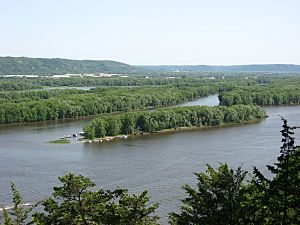
The visitor center is at the park entrance. It has museum exhibits about the area's history and nature. There's also an auditorium and a gift shop. You can explore the park on 14 miles (22.5 km) of hiking trails. There are no paved roads for cars inside the park itself.
Park rangers offer guided hikes and show how ancient tools were made. These events are usually scheduled from mid-June through Labor Day weekend. Special educational programs can also be arranged.
Nature and Nearby Places
The monument is home to beautiful forests, tallgrass prairies, wetlands, and rivers. You won't find places to stay or camp inside the park. However, camping is available at nearby Pikes Peak State Park and Yellow River State Forest in Iowa. Wyalusing State Park in Wisconsin is also close by.
The national monument is very close to Marquette, Iowa. It's also just across the Mississippi River from Prairie du Chien, Wisconsin.
History of the Monument
Effigy Mounds was officially named a National Monument on October 25, 1949. People like Charles R. Keyes and Ellison Orr worked hard to study and map the area. They helped show how important it was to protect these ancient sites.
The Driftless Area
Effigy Mounds National Monument is located in a special region called the Driftless Area. This part of North America was not covered by glaciers during the last ice age. This is different from most of Iowa. The nearby Driftless Area National Wildlife Refuge is named after this unique region.
The National Park Service explains that this area has very old glacial soil from over 500,000 years ago. Because glaciers didn't cover it, streams have carved deep channels into the rocky land. This creates a landscape with thin soil, deep river valleys, and karst features like sinkholes and caves.
Protecting the Mounds
Over the years, there have been challenges in protecting the monument. From 1999 to 2009, there were issues with construction projects that caused harm to important archaeological sites. These projects did not follow proper rules for protecting historical places.
Later, in 2016, a former superintendent of the monument faced consequences for removing ancient Native American bones from the park's museum in 1990. This happened around the time the Native American Graves Protection and Repatriation Act (NAGPRA) was being created. This law helps return Native American remains and sacred objects to their tribes. The former superintendent was found to have caused damage to the bones.
After these events, new leaders worked to fix the damaged areas of the park. They also worked to improve relationships with local communities and the Native American tribes connected to the site. In 2022, archaeologist Susa Snow became the new superintendent. Also in 2022, the National Park Service and the Iowa Tribe of Kansas and Nebraska (ITKN) created a special "Tribal Sister Park" agreement. This was the first time a U.S. national park partnered with a Tribal Nation's national park in this way.
See also
 In Spanish: Monumento nacional Effigy Mounds para niños
In Spanish: Monumento nacional Effigy Mounds para niños
- Iowa archaeology
- Native American tribes in Iowa
- List of national monuments of the United States
- Marching Bear Group


